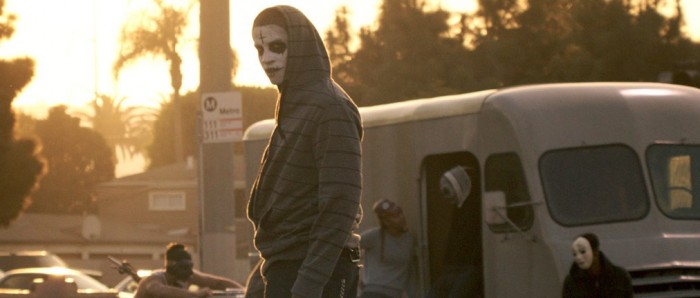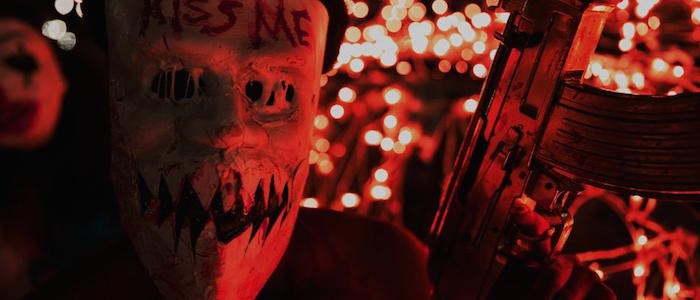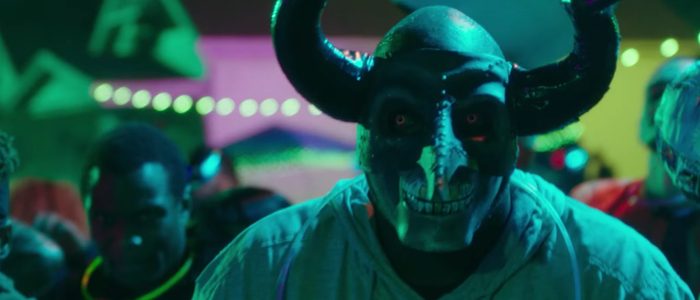How 'The Purge' Became The Most Unexpectedly Important Horror Franchise Of The Decade
The greatest trick The Purge (2013) ever pulled was convincing us at first that it is your run-of-the-mill home invasion thriller, directing us to think that the protagonists are the typical wealthy white family in the suburbs and the villains are the hoodlums in the streets who've waited all year to terrorize them without consequences. Sure, there is a moment early in the film which establishes that the Sandin family — led by mom Mary (Lena Headey) and dad James Sandin (Ethan Hawke) — may not be the most liked in the neighborhood, but we're generally still supposed to root for them. Especially when on the night of the annual Purge, when all crime is legal for 12 hours, they intentionally choose not to participate.
But as the movie progresses, we learn that things are not so black and white — at least not when it comes to the morality of our protagonists versus that of the street thugs. Because the annual Purge — a law established by the nation's political New Founding Fathers (NFFA) in efforts to dissolve crime by murdering the poor and weak and elevating the rich, privileged, and usually white — has allowed the affluent Sandins the choice to simply lock up their home with the most expensive security system around and remain oblivious to the terror outside. As James even says early in the film, if their family was still poor, they'd definitely participate "because it does work."
That's what's so great about The Purge; it challenges our perceptions of right and wrong and how that's impacted by a broken yet highly functional society — one not unlike our own.
The Sandins' sense of righteousness is turned on its head when they become prey to their own moral standard after their son Charlie (Max Burkholder) welcomes a destitute black man into their home just as he's about to be crucified by the purgers. Clearly, mom and dad's moral ambiguity has not been passed on to their son. This means that they become an instant target. At first, they do the instinctual thing — try to purge the intruder or just deliver him to the purgers outside. But then, they have a surprising change of heart and decide to fight against the mob that at this point has broken inside their safe haven. Lots of blood gets shed, including that of James, who doesn't live to see sunrise, and the homeless intruder poetically becomes the very reason the rest of the Sandins survive the night. It's a rather tidy conclusion that still manages to ask the audience the franchise's most provocative questions: If The Purge was real, would you participate? And if so, would that make you a bad person?

While The Purge sets up the construct of this frightening world — heightened by our real-life society's relationship with rage, violence, privilege, and criminal immunity — The Purge: Anarchy (2014) rationalizes how far we'd go to protect and avenge our family in an increasingly lawless state. Because the narrative revolves around the have nots, there is a particular desperation that comes with the fundamental need to love and be loved, especially when that's all you have. That hits home for so many of us.
This is illuminated in the story of Leo Barnes (Frank Grillo), an ex-police sergeant whose son was killed by a drunk driver acquitted of the crime before the events of the film. He embarks on a solo mission to murder the man responsible for his child's death. And fittingly, Dante Bishop (played by Edwin Hodge, otherwise known as the unnamed black man from the first film) has staged his own reckoning triggered by the senseless murders of those in his own life.
At the moral center of Anarchy and continuing with the franchise's tradition of centering the story on non-threatening protagonists who don't participate in the Purge, is a single Latinx mother named Eva Sanchez (Carmen Ejogo) and her daughter Cali (Zoe Soul), who live in a small apartment with their father/grandfather Papa Rico (John Beasley). Unlike the Sandins, there is no question about Eva and Cali's morality — they never kill a single person in the movie, even when they're dragged out of their home and into the terror of the night. They represent the surviving victims of the Purge, offering a compassionate story in the midst of mayhem. Through their narrative, the film introduces the concept of sacrificing your life in order to protect and provide for your family. That's what Papa Rico does for Eva and Cali; he delivers himself to the purgers who in exchange wire money into his family's account. Even though it's presented in a dystopian state, the Purge continues to mirror and interrogate real-life models, including the business of life insurance and how that affects the poor.
So, in that sense, and despite its title, Anarchy devises a way for the have nots to control their fate so that even when they're losing the battle they're doing it on their own terms. The same goes for Leo and Dante, who try to take matters into their own hands—even when their morality prevents them from seeing it through. The franchise's enduring question now becomes personal: what would you do if you could avenge the death of a loved one without any repercussions? Would that make you a hero or a villain? In this world, is there a difference?

Where Anarchy has heart, The Purge: Election Year (2016) throws all niceties, compassion, and hope right out the window as we center on the lives of the angry and oppressed, resonating with the average paycheck-to-paycheck American audience member working hard just to survive to the next day. Releasing in theaters at the time when American anxiety had reached its peak — divided by the idea of a radical conservative (Donald Trump) versus a radical progressive (Hillary Clinton) to lead the "free world" — Election Year chillingly resonates with the jaded and afraid.
Similar to her real-world counterpart, Senator Charlie Roan (Elizabeth Mitchell) is all about change — and her first order of business is eradicating the Purge and dismantling the New Founding Fathers that stand behind it. Meanwhile, her opponent Minister Edwidge Owens (Kyle Secor) fights hard to protect the status quo — even going as far as attempting to assassinate Roan.
What makes Election Year so remarkable is that by this third film, reality has finally caught up with the franchise's dystopian landscape. And it only took a few short years. The fascinating questions the franchise once asked are no longer ones to simply ponder as hypotheticals. They are on our minds every single day. What would you do if a leader was presented who promised change? Would you unconditionally advocate for her — despite a deep sense of weariness and distrust of a system that has continuously left you at a disadvantage? Or would you turn the other cheek, because you've grown accustomed to having to navigate a dog-eat-dog world and have finally figured out a way that it can serve you? The answer may seem so clear, but then again, the results of our own election proved even in the most black and white situations there is always room for wide shades of grey.
A persistent indifference in the system yields a sense of selfish motivation when considering the fate of the around you versus devising a plan for your own survival. For these characters, the world at this point is inevitable ruin, but they may still have the opportunity to save themselves. Leo returns to the franchise, this time as Roan's lead security officer who's motivated by a personal need to see her platform come to fruition—which includes making sure she survives the night. Dante is also back and has aligned himself with a team that is focused on assassinating the minister.
Meanwhile, store owner Joe Dixon (Mykelti Williamson) is driven by his right to "a slice of the pie" as the world falls apart around him. The store is the one thing he has in this state of ruin, the one thing that differentiates him from a disposable working class black man to a so-called valuable member of society. He participates in the Purge to protect his property and those in his life who struggled and fought to merely reach for the American dream. Like Laney Rucker (Betty Gabriel), whose life Joe helped turn around from petty crime. Now she drives around in an armored car on Purge night to save those who can't save themselves. Same with Marcos (Joseph Julian Soria), who came to America for a better life and discovers he's a mere pawn in a system designed to work against him. Surviving the night is a typical function of the have nots, one that is only heightened on Purge night.
Even despite the functional chaos, there is something distinctly American, disturbingly patriotic that is highlighted in Election Year — our history of violence and centuries-long relationship with protecting it. Throughout the film there is an image of the guillotine which predated the 19th century in North America, a bloodied Abraham Lincoln statue erected in 1920 that you can see through the front columns of the Lincoln Memorial—each one spelling out the word P-U-R-G-E. It makes sense; our history is rooted in the belief that we must destroy and annihilate in order to live in a functional society. It's no real coincidence that the NFFA sounds remarkable close to the NRA.
What Election Year hones in on is our need to uphold and celebrate tradition, even using songs like Miley Cyrus' "Party in the USA" at the height of the action and concluding with David Bowie's poignant "I'm Afraid of Americans" in the closing credits. There's a tone of despair even as Roan seals the vote at the end of the film. Will anything really change? Is hope but a mere myth in a society that is seemingly beyond repair?

As the third film reaches a boiling point for America, it's a natural move for the franchise — by mastermind creator and writer James DeMonaco — to trace and try to understand how we got here. What we learn in The First Purge, in theaters this week, is that things didn't look much different back when it was merely an experiment — except that the government was a main participant. The Purge's purpose — and the government makes no qualms about this — is to specifically and intentionally center it in a low-income neighborhood on Staten Island, New York, predominantly filled with people of color for the sake of, as they say, "population control."
It's hard not to draw parallels between this structure and the beginnings of the cocaine epidemic in the United States, where law enforcement helped plant the drug in minority neighborhoods — for the same reason that we see in this latest film. Similarly, the tenants are offered an incentive, $5000 to be exact, to purge to their heart's content and just pray that they survive the night to collect.
Like violence, preying on the desperate and underserved — and inciting a civil war among them — is also rooted in our history, but contrary to government expectations, many are unwilling to participate. It's an experiment; and history will tell you that people of color haven't fared well when it comes to government experiments. So, citizens like Nya (Lex Scott Davis) and her brother Isaiah (Joivan Wade) plan not to participate. Even gang leader Dmitri (Y'lan Noel) tells his men to stay out of it. Nothing seems right about any of this.
Though some do take the opportunity to purge, it is the government who ends up stepping in with hours left on the clock, to speed things along. Donning masks like the natural purgers, and far more sophisticated weapons, they take out countless citizens who opted to stay indoors for the Purge. Whether or not this is supposed to highlight the origins of black-on-black crime is unclear, but there is an alarming correlation between the role of the government when it comes to crime in disadvantaged neighborhoods.
For anyone who identifies as a minority in these situations, the church is often seen as a safe haven that they can go to find some sense of peace in a vicious world. But, as we've also seen throughout history, the church is raided by men in pointy white hats, leaving countless massacred. Where do you go when both your home and the church — the two places you go for comfort and civility — are no longer safe? Where do you go when you realize that your own government is not on your side?
For our central characters, it ultimately means that they must purge. It illustrates the cycle of rage we have — rooted by frustration in a society built around the notion that they are utterly expendable. We've arrived at the pinnacle point in our own history where movements like Black Lives Matter, Times Up, and Me Too are grounded by a fury that we can no longer contain. This sensibility is a fundamental force that drives us to consider what we would do if we could turn the tables around and for once land on top — without any consequences?
After all, it is the American way.
